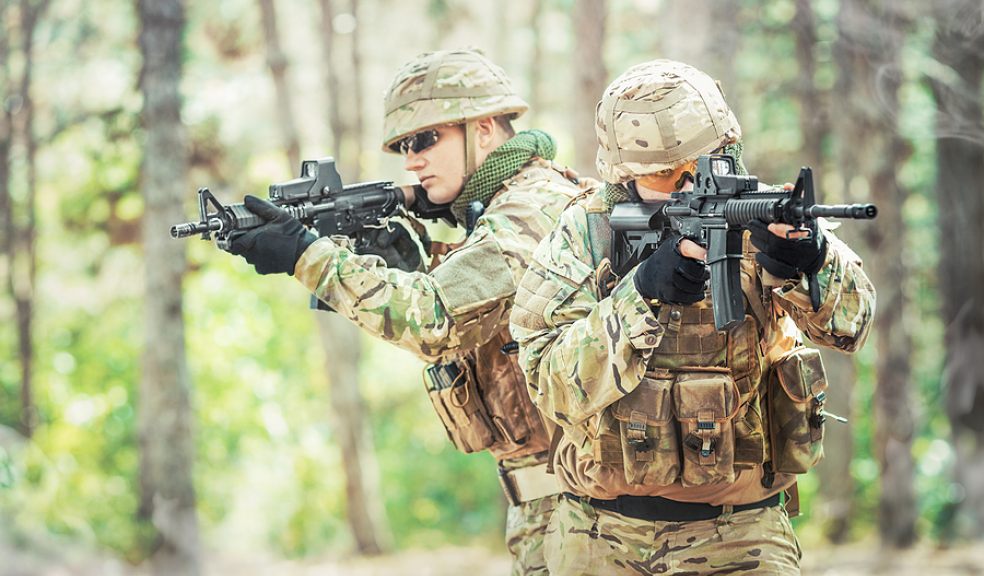
Call for improvements in the way Army Reserve Forces are trained and supported
Improvements to the way that Army Reserve Forces are trained and supported are needed if recruitment and retention targets are to be met, according to a new study.
Progress has been made in implementing the Army’s Future Reserves 2020 reform programme, but more must be done if reservists are to be used effectively to fulfil the nation’s defence objectives, according to the preliminary results of a new study.
Experts will present their interim results from a survey of reservists to MPs on the All-Party Parliamentary Group for Reserve Forces and Cadets on Tuesday, 5 July.
Reservists give up their spare time to serve in the Army at home and on deployment around the world. When not mobilised or deployed, their duties are carried out at the evenings, weekends and during their annual leave. Their families should be better supported as they play an increasingly important supporting role within the Army, experts from the University of Exeter and Cardiff University have suggested.
The Government wants reserve forces to play a key role in building capacity and adding specialist skills to the Army. During more than ten years of the “Global War on Terror” more than 27,000 reservists were deployed to Iraq and Afghanistan.
Policymakers have said that there needs to be 30,000 trained reservists and up to 7,000 Reservists in training by 1 April 2019, a significant recruitment and retention challenge for the Army at a time when until recently numbers of soldiers had been declining. Currently, the Army Reserve has just over 23,000 trained reservists.
The Government has pledged to invest £1.2 billion over 10 years to pay for a fully manned Army Reserve by 2019 and to carry out organisational reforms in key areas including training, equipment, personnel and infrastructure.
New research from Dr Sergio Catignani Senior Lecturer in Security and Strategic Studies at the University of Exeter’s Strategy and Security Institute and Dr Victoria Basham, Senior Lecturer in International Relations at Cardiff University, highlights the potential challenges of meeting these targets, and also opportunities. Their emerging findings suggest that if all Reservists are to feel “valued and valuable” further changes are still necessary.
Dr Catignani and Dr Basham interviewed regiment commanding officers who stated that they are finding it demanding to fulfil the increasing number of training commitments, defence engagement and community outreach tasks they are expected to carry out without this affecting morale. The increasing number of commitments is making it harder for them to focus on developing their core capabilities and, therefore, making it harder for them to achieve operational readiness.
Commanding officers also told researchers that staff retention has been affected, because of an over-emphasis on recruitment efforts.
Reserve soldiers who took part in the study said that the increased training, altered so it was less repetitive and boring, still does not live up to the expectations of many recruits. One reservist said: “it probably doesn't always live up to the excitement that you see on the Army Reserve television advertisements when there's tanks and all sorts rolling along ... probably the reality of that, a lot of the time, is that you’re in classrooms going through PowerPoint presentations on law of armed conflict or doing chest compressions and first aid type stuff.”
Dr Catignani said: “The missing and key variable in sustaining the Reserves to 2020 and beyond is the family. It is becoming difficult for reservists to separate their role from their other major life commitments, because the expanded range of opportunities for Reservists provided under the FR2020 proposition can mean more contact with the Army when a Reservist is not attending training. Members of their family have told us this ‘constant’ contact has had a significant impact on the family life of those interviewed. We appreciate that much work has been carried out by the Army to keep employers on-side, but greater efforts need to be directed towards supporting Reservists’ families, particularly outside of deployment.”
Dr Basham said: “It Is clear from our interviews that Reservists depend on family members, particularly female partners, to ‘pick up the slack’. Most of these women, and in some cases men, willingly do so because they understand how important Reserve service is to their partners. Reserve service can still be hard on couples and families though not least, because it so often infringes on the time they get to spend together”.
Their interim report, due to be published later this year, Sustaining Future Reserves 2020: Assessing Organisational Commitment in the Reserve, will recommend that expectations of reservists and reserve units need to be better grounded in the reality that reservists can only serve during their “spare time”, unless mobilised.
It will also recommend that further attention needs to be paid to the scheduling and quantity of training on offer in order to take into better account the challenges reservists have in balancing their work, family, personal and reserve commitments.
Dr Catignani and Dr Basham will also suggest that promotional opportunities within the Reserves need to be made more readily available to reservists, and that the Army should work more closely with the immediate line managers of reservists and not just engage at the corporate level to foster greater employer support for Reserve service.
This project is part of the Future Reserves Research Programme and co- funded by the Economic and Social Research Council and the Ministry of Defence.
The opinions expressed by the individual researchers do not reflect the views of the funders.

















